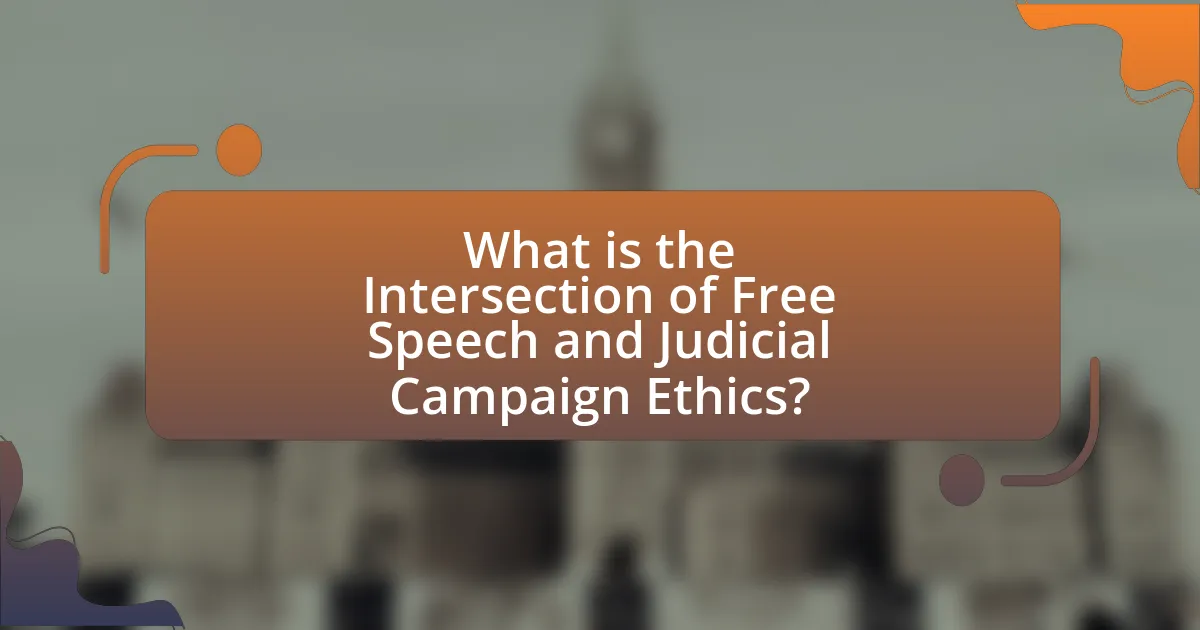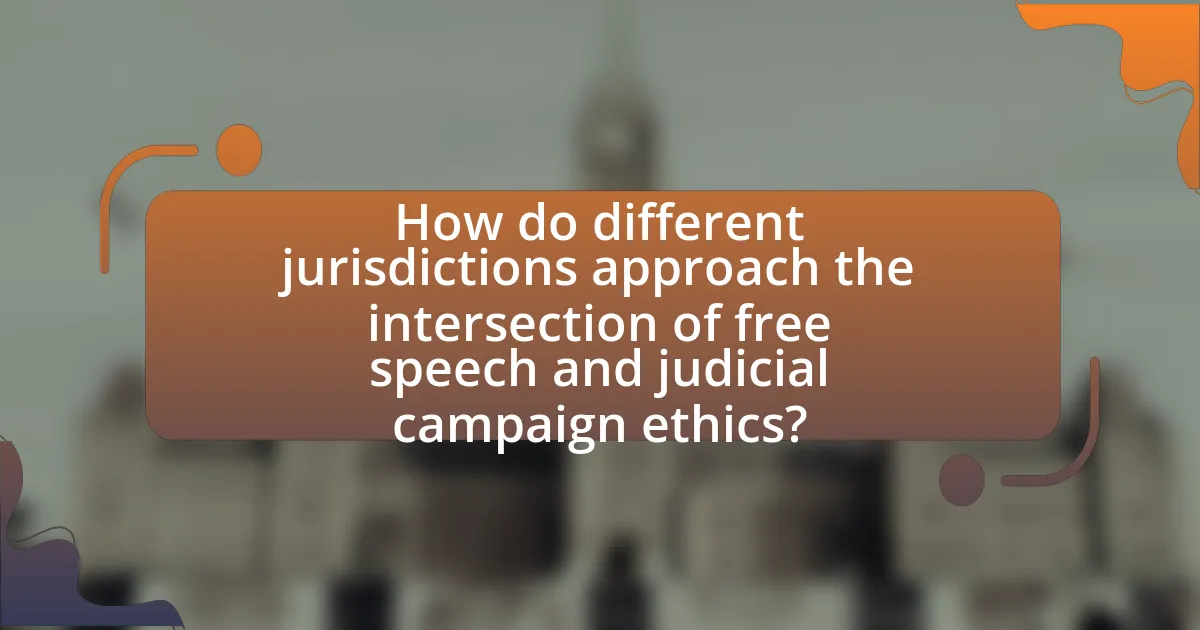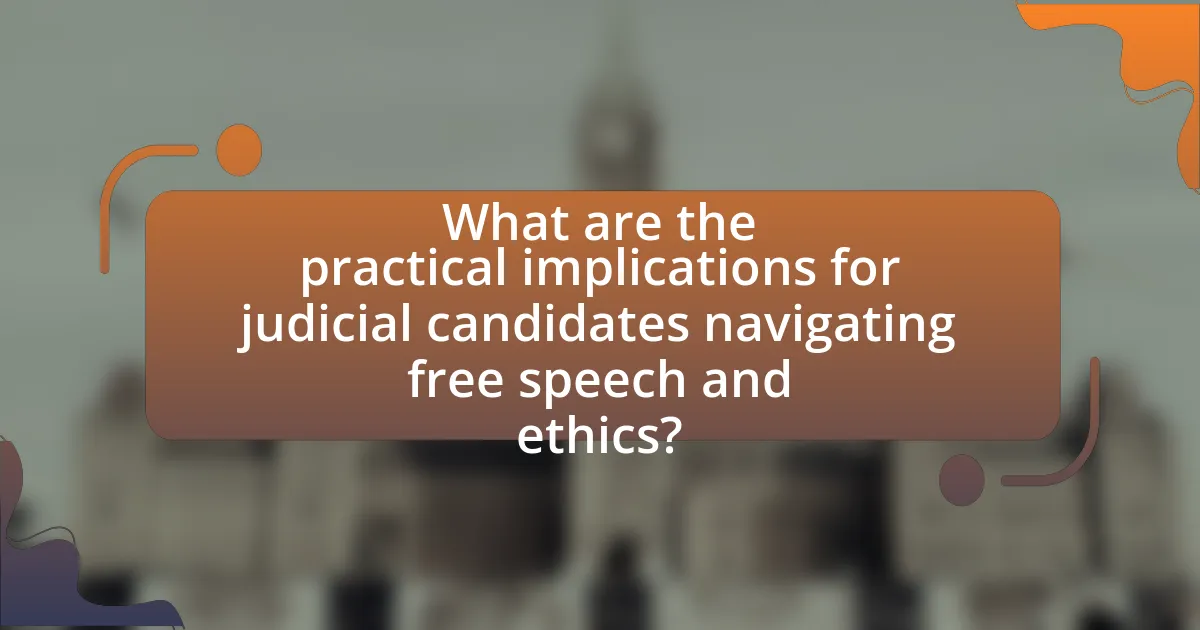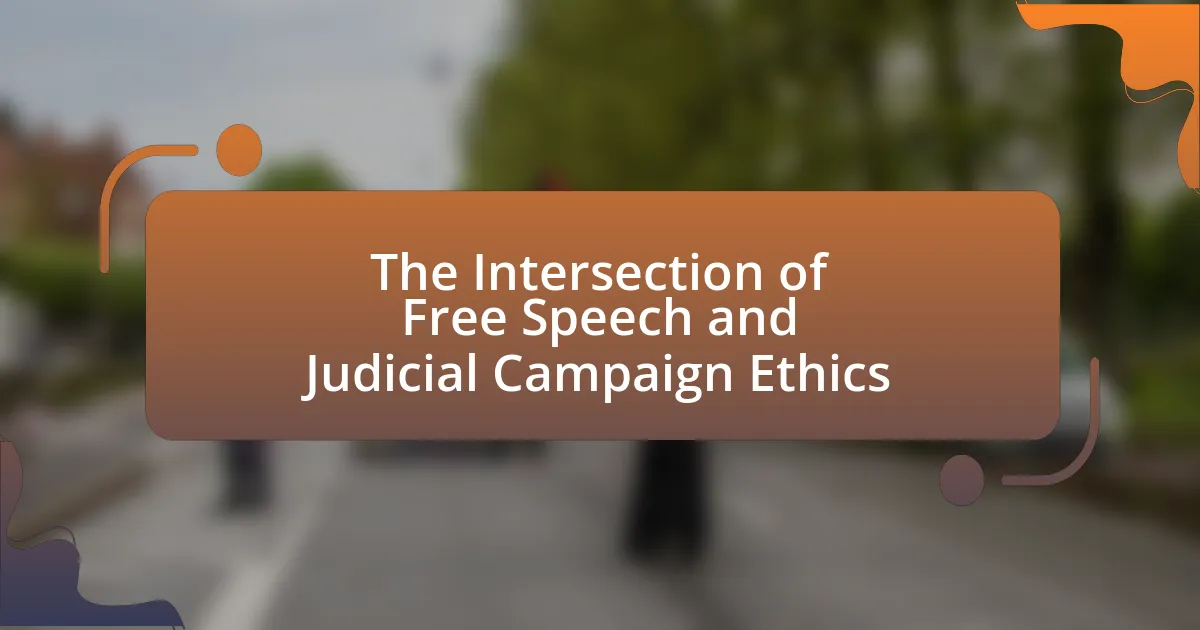The article examines the intersection of free speech and judicial campaign ethics, focusing on the balance between candidates’ rights to express political views and the ethical standards that govern their conduct. It discusses how free speech principles, particularly the First Amendment, influence judicial campaigns while highlighting the ethical obligations outlined in the American Bar Association’s Model Code of Judicial Conduct. Key legal frameworks, challenges, and variations in regulations across different jurisdictions are explored, along with the implications for candidates navigating these complexities. The article emphasizes the importance of maintaining public confidence in the judiciary while allowing candidates to communicate their qualifications and philosophies effectively.

What is the Intersection of Free Speech and Judicial Campaign Ethics?
The intersection of free speech and judicial campaign ethics involves balancing the right to express political views with the ethical standards governing judicial candidates. Judicial candidates often engage in campaign speech to communicate their qualifications and judicial philosophies; however, they must adhere to ethical guidelines that prohibit statements that could undermine public confidence in the judiciary. For instance, the American Bar Association’s Model Code of Judicial Conduct emphasizes that judges and candidates should avoid making misleading statements and should maintain the integrity of the judiciary. This creates a complex dynamic where candidates must navigate their free speech rights while upholding the ethical obligations that ensure fairness and impartiality in the judicial system.
How do free speech principles apply to judicial campaigns?
Free speech principles significantly influence judicial campaigns by allowing candidates to express their views and engage in political discourse. The First Amendment protects the right of judicial candidates to communicate their positions, advocate for their election, and discuss legal issues relevant to their candidacy. This protection is crucial because it enables transparency and informs voters about candidates’ philosophies and qualifications. For instance, the U.S. Supreme Court case Republican Party of Minnesota v. White (2002) ruled that restrictions on judicial candidates’ speech, particularly regarding their views on legal issues, violated free speech rights. This case illustrates how free speech principles are essential in ensuring that judicial campaigns remain open and democratic, allowing voters to make informed choices based on candidates’ expressed beliefs and values.
What are the key legal frameworks governing free speech in this context?
The key legal frameworks governing free speech in the context of judicial campaign ethics include the First Amendment of the United States Constitution, which protects the right to free speech, and various state laws regulating campaign conduct. The First Amendment ensures that individuals can express political opinions without government interference, while state laws often impose restrictions on campaign financing and advertising to maintain judicial impartiality. For example, the Supreme Court case Buckley v. Valeo (1976) established that spending money to influence elections is a form of protected speech, but states can regulate contributions to prevent corruption. Additionally, the American Bar Association’s Model Code of Judicial Conduct provides ethical guidelines for judges and candidates, emphasizing the need to avoid impropriety and maintain public confidence in the judiciary. These frameworks collectively shape the balance between free speech and the ethical standards expected in judicial campaigns.
How do these principles impact judicial candidates’ communication?
Judicial candidates’ communication is significantly impacted by principles of free speech and judicial campaign ethics, as these principles dictate the boundaries within which candidates can express their views and engage with the public. Specifically, candidates must navigate the ethical obligation to maintain impartiality while also exercising their right to free speech, which can lead to constraints on the types of statements they can make regarding legal issues or cases. For instance, the American Bar Association’s Model Code of Judicial Conduct emphasizes that candidates should avoid making statements that could be perceived as prejudging issues that may come before them in court, thereby ensuring that their communication does not compromise the integrity of the judicial system. This balance between free expression and ethical responsibility shapes how candidates craft their messages, often leading them to focus on general qualifications and experiences rather than specific legal opinions or positions.
Why is judicial campaign ethics important in the context of free speech?
Judicial campaign ethics is important in the context of free speech because it ensures that the integrity of the judicial system is maintained while allowing candidates to express their views. Ethical guidelines govern judicial campaigns to prevent conflicts of interest and maintain public confidence in the impartiality of judges. For instance, the American Bar Association’s Model Code of Judicial Conduct emphasizes that judges must avoid any appearance of bias or impropriety, which is crucial for upholding the principle of fair trial rights. This balance between free speech and ethical conduct is vital, as unchecked campaign rhetoric can undermine the public’s trust in judicial impartiality and the rule of law.
What ethical standards govern judicial candidates?
Judicial candidates are governed by ethical standards that primarily include adherence to the Model Code of Judicial Conduct, which outlines principles such as integrity, impartiality, and independence. These standards require candidates to avoid any conduct that undermines public confidence in the judiciary, including refraining from making misleading statements and engaging in partisan political activities. The American Bar Association’s Model Code serves as a framework for many states, emphasizing that judicial candidates must maintain the dignity of the judicial office and ensure that their campaign activities do not compromise their impartiality or the integrity of the judicial system.
How do these standards interact with free speech rights?
Judicial campaign ethics standards interact with free speech rights by imposing restrictions on candidates’ speech to maintain the integrity of the judicial system. These standards aim to prevent judicial candidates from making statements that could compromise their impartiality or the public’s perception of the judiciary. For example, the American Bar Association’s Model Code of Judicial Conduct includes provisions that limit candidates from making pledges or promises regarding cases, which can be seen as a restriction on free speech. This balance seeks to uphold the principle that judges must remain neutral and fair, thereby justifying the limitations on speech in the context of judicial campaigns.
What challenges arise at the intersection of free speech and judicial campaign ethics?
Challenges at the intersection of free speech and judicial campaign ethics include the potential for judicial candidates to make statements that compromise their impartiality. When candidates express opinions on legal issues or cases, they risk undermining public confidence in their ability to be fair and unbiased judges. For instance, the American Bar Association’s Model Code of Judicial Conduct emphasizes that judges must avoid political activity that could cast doubt on their integrity or impartiality. Additionally, the Supreme Court’s decision in Williams-Yulee v. Florida Bar (2015) upheld restrictions on judicial candidates’ personal fundraising efforts, highlighting the tension between free speech rights and the need to maintain the judiciary’s integrity. This case illustrates how judicial campaign ethics can limit free speech to preserve public trust in the legal system.
What are the potential conflicts between free speech and ethical obligations?
Potential conflicts between free speech and ethical obligations arise when the exercise of free speech undermines the integrity of judicial processes or the ethical standards expected of legal professionals. For instance, judges and judicial candidates are often bound by codes of conduct that require them to maintain impartiality and avoid statements that could be perceived as prejudicial to ongoing cases. When individuals express opinions or make statements that could influence public perception or the outcome of legal proceedings, it creates a tension between their right to free speech and their ethical duty to uphold the justice system’s integrity. This conflict is evident in cases where judicial candidates engage in campaign rhetoric that may compromise their perceived neutrality, thereby violating ethical obligations to remain unbiased and fair.
How do these challenges affect public perception of the judiciary?
Challenges such as perceived bias, lack of transparency, and the influence of campaign financing significantly undermine public perception of the judiciary. When the public believes that judges may be swayed by political pressures or financial contributions, trust in their impartiality diminishes. According to a 2021 survey by the American Bar Association, 70% of respondents expressed concern that campaign contributions could affect judicial decisions, highlighting a widespread belief that financial influences compromise judicial integrity. This erosion of trust can lead to a lack of confidence in legal outcomes and a perception that the judiciary is not an independent arbiter of justice.

How do different jurisdictions approach the intersection of free speech and judicial campaign ethics?
Different jurisdictions approach the intersection of free speech and judicial campaign ethics through varying regulations and interpretations of constitutional protections. For instance, in the United States, the First Amendment protects free speech, but states impose restrictions on judicial candidates to maintain impartiality and public confidence in the judiciary. Some states, like California, allow candidates to express views on legal issues, while others, such as Texas, impose stricter limits on campaign speech to prevent the appearance of bias. These differences reflect a balance between protecting free speech and ensuring ethical standards in judicial campaigns, as seen in the American Bar Association’s Model Code of Judicial Conduct, which advises judges to avoid political activity that undermines their integrity.
What variations exist in judicial campaign regulations across states?
Judicial campaign regulations vary significantly across states, with differences in contribution limits, advertising rules, and disclosure requirements. For instance, some states impose strict limits on campaign contributions to judicial candidates, while others have no limits at all. Additionally, states like Texas require judicial candidates to adhere to specific ethical guidelines regarding campaign conduct, whereas states such as California allow more leniency in campaign messaging. Furthermore, disclosure requirements for campaign financing can differ, with some states mandating detailed reporting of contributions and expenditures, while others have minimal reporting obligations. These variations reflect the balance each state seeks between maintaining judicial impartiality and allowing free speech in campaign contexts.
How do these regulations reflect differing views on free speech?
Regulations on judicial campaign ethics reflect differing views on free speech by balancing the right to express political opinions with the need to maintain judicial impartiality. For instance, some regulations restrict candidates from making certain statements to prevent bias in the judiciary, illustrating a view that prioritizes the integrity of the legal system over unrestricted speech. Conversely, other regulations advocate for broader free speech rights, arguing that candidates should be able to communicate their views freely to the electorate. This tension is evident in cases like Republican Party of Minnesota v. White, where the Supreme Court ruled that restrictions on judicial candidates’ speech violated the First Amendment, highlighting the ongoing debate between protecting free speech and ensuring fair judicial processes.
What are the implications of these variations for judicial candidates?
Variations in free speech interpretations and judicial campaign ethics significantly impact judicial candidates by shaping their campaign strategies and public engagement. Candidates must navigate the complexities of permissible speech, as differing interpretations can lead to varying levels of scrutiny and potential repercussions for their statements. For instance, candidates in jurisdictions with strict campaign ethics may face limitations on their ability to discuss certain issues or engage in specific forms of speech, which can hinder their outreach efforts. Furthermore, the potential for public backlash or legal challenges arising from controversial statements necessitates a cautious approach to communication. This dynamic underscores the importance of understanding local regulations and the broader implications of free speech in judicial contexts, as candidates must balance their right to express opinions with the ethical standards expected of judicial officeholders.
How do federal laws influence state judicial campaign ethics?
Federal laws significantly influence state judicial campaign ethics primarily through the First Amendment, which protects free speech, including political speech. This constitutional protection has led to landmark Supreme Court decisions, such as Buckley v. Valeo (1976), which established that spending money to influence elections is a form of constitutionally protected free speech. Consequently, states must navigate the balance between regulating judicial campaign conduct and upholding these federal free speech protections. For instance, while states can impose certain ethical standards on judicial candidates, they cannot enact laws that unduly restrict campaign contributions or expenditures, as this would conflict with federal interpretations of free speech rights.
What role does the First Amendment play in shaping these laws?
The First Amendment plays a crucial role in shaping laws related to free speech and judicial campaign ethics by protecting individuals’ rights to express their opinions and engage in political discourse. This constitutional protection influences legislation and judicial decisions regarding campaign financing, advertising, and the conduct of judicial candidates. For instance, the Supreme Court’s decision in Citizens United v. FEC (2010) underscored the First Amendment’s impact by ruling that political spending is a form of protected speech, thereby affecting how judicial campaigns are financed and conducted. This ruling illustrates how the First Amendment shapes the legal landscape surrounding campaign ethics, emphasizing the balance between free expression and the integrity of the judicial system.
How have recent Supreme Court decisions impacted judicial campaign practices?
Recent Supreme Court decisions have significantly impacted judicial campaign practices by expanding the scope of permissible campaign speech and reducing restrictions on campaign financing. For instance, the 2010 decision in Citizens United v. FEC allowed for unlimited independent expenditures by corporations and unions in political campaigns, which has led to an increase in the amount of money spent on judicial races. Additionally, the 2018 case of Janus v. AFSCME further weakened the financial constraints on public sector unions, affecting their ability to support judicial candidates. These rulings have resulted in a landscape where judicial candidates may rely more heavily on large donations and outside spending, raising concerns about the influence of money on judicial impartiality and ethics.

What are the practical implications for judicial candidates navigating free speech and ethics?
Judicial candidates face significant practical implications when navigating the intersection of free speech and ethics, primarily concerning their ability to express opinions while adhering to ethical standards. Candidates must balance their right to free speech with the ethical obligations that require them to maintain impartiality and avoid any appearance of bias. For instance, the American Bar Association’s Model Code of Judicial Conduct emphasizes that candidates should not make statements that could undermine public confidence in their impartiality. This means that while candidates can discuss their views on legal issues, they must refrain from making commitments on how they would rule on specific cases. Failure to navigate this balance can lead to disciplinary actions or disqualification from the race, as seen in various cases where candidates faced scrutiny for their public statements. Thus, judicial candidates must carefully craft their messaging to ensure compliance with ethical guidelines while still engaging with voters.
What strategies can judicial candidates employ to balance free speech and ethical considerations?
Judicial candidates can employ strategies such as adhering to established ethical guidelines, engaging in transparent communication, and focusing on issue-based campaigning to balance free speech and ethical considerations. Adhering to ethical guidelines, such as those set by the American Bar Association, helps candidates navigate the complexities of free speech while maintaining integrity. Transparent communication allows candidates to express their views without misleading voters, ensuring that their speech aligns with ethical standards. Additionally, focusing on issue-based campaigning rather than personal attacks or inflammatory rhetoric promotes a respectful discourse that upholds both free speech and ethical considerations. These strategies are supported by the need for judicial candidates to maintain public trust and the integrity of the judicial system, as evidenced by various state judicial conduct codes that emphasize the importance of ethical campaigning.
How can candidates effectively communicate their messages while adhering to ethical standards?
Candidates can effectively communicate their messages while adhering to ethical standards by ensuring transparency, accuracy, and respect for the judicial process. Transparency involves clearly disclosing affiliations, funding sources, and potential conflicts of interest, which builds trust with the electorate. Accuracy is crucial; candidates must present factual information and avoid misleading statements, as evidenced by the American Bar Association’s Model Code of Judicial Conduct, which emphasizes the importance of honesty in judicial campaigns. Respect for the judicial process includes refraining from making statements that could undermine public confidence in the judiciary, aligning with ethical guidelines that promote the integrity of the legal system.
What resources are available to help candidates understand their rights and responsibilities?
Candidates can access various resources to understand their rights and responsibilities, including official state election office websites, legal aid organizations, and educational materials from judicial ethics boards. State election offices provide guidelines on campaign conduct, voter rights, and compliance with election laws. Legal aid organizations often offer free consultations and resources that clarify candidates’ legal obligations and rights during campaigns. Additionally, judicial ethics boards publish codes of conduct and advisory opinions that outline the ethical responsibilities of candidates running for judicial positions. These resources collectively ensure candidates are informed about their rights and responsibilities in the context of judicial campaign ethics.
What common pitfalls should judicial candidates avoid in their campaigns?
Judicial candidates should avoid making statements that could be perceived as prejudging cases or issues that may come before them. This is crucial because such statements can undermine public confidence in their impartiality and violate ethical guidelines established by judicial conduct codes. For instance, the American Bar Association’s Model Code of Judicial Conduct emphasizes the importance of maintaining the integrity and independence of the judiciary, which can be compromised by campaign rhetoric that suggests bias or predetermined outcomes. Additionally, candidates should refrain from engaging in negative campaigning against opponents, as this can detract from the focus on qualifications and judicial philosophy, further eroding public trust in the judicial system.
How can candidates ensure compliance with both free speech rights and ethical guidelines?
Candidates can ensure compliance with both free speech rights and ethical guidelines by adhering to established legal frameworks and ethical standards specific to judicial campaigns. This involves understanding the First Amendment protections that allow for free expression while simultaneously following the American Bar Association’s Model Code of Judicial Conduct, which emphasizes the importance of maintaining the integrity and impartiality of the judiciary. For instance, candidates should avoid making statements that could be perceived as prejudicial to ongoing cases or that undermine public confidence in the judiciary, as outlined in Rule 4.1 of the Model Code. By balancing their right to free speech with these ethical obligations, candidates can navigate the complexities of judicial campaigning effectively.
What lessons can be learned from past judicial campaign controversies?
Past judicial campaign controversies highlight the importance of maintaining ethical standards and transparency in judicial elections. These controversies often reveal that negative campaigning can undermine public trust in the judiciary, as seen in the 2000 Illinois Supreme Court race, where aggressive attack ads led to widespread criticism and calls for reform. Additionally, the controversies demonstrate the need for clear regulations regarding campaign financing, as excessive contributions can create perceptions of bias, illustrated by the 2011 Wisconsin Supreme Court election, which saw record spending and allegations of undue influence. Ultimately, these lessons emphasize the necessity for judicial candidates to prioritize integrity and accountability to preserve the public’s confidence in the judicial system.
